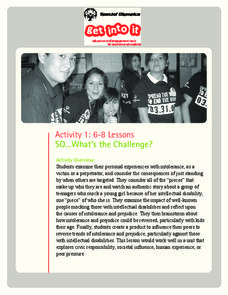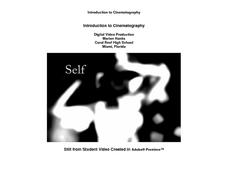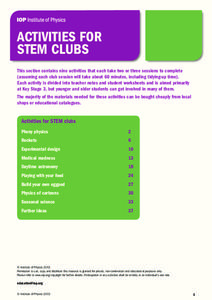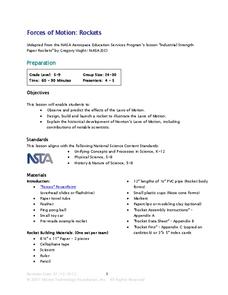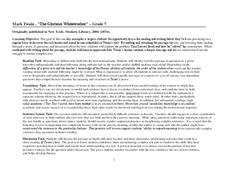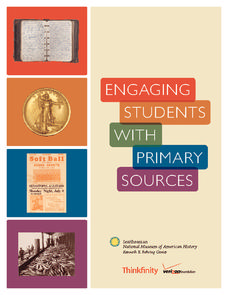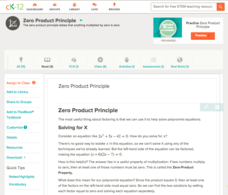Madison Public Schools
Journalism
Whether you are teaching a newspaper unit in language arts, covering the First Amendment and censorship in social studies, or focusing on writing ethics in journalism, a unit based on the foundations of journalism would be an excellent...
Curated OER
Close Reading Passages of Literature
Encourage kids to think deeply about what they are reading with five thought-provoking questions about one passage. After choosing a passage that is intriguing or confusing to them, learners write a summary, explain what they like or...
Waunakee Community School District
Identifying Themes in Literature
If your language arts learners have a hard time determining the universal theme of a written work, use a straightforward learning exercise to help them find it. After reviewing a list of common themes, kids note the title, character,...
Scholastic
Reading Characters
Philip Pullman's The Golden Compass provides the text for a study of how writers bring characters to life. Using the provided character mapping worksheets, readers respond to questions and then write a short character sketch.
PBS
Act of Duty
PBS provides educators with this "Utilization Guide," a four segment program that covers the Civil War, World War I, World War II, the Korean conflict, Vietnam, and the Gulf War. The 42-page packet includes lessons, background...
Military Kids Connect
Military Life 101
Here's a very powerful video that deserves a place in a Veterans Day lesson. Four young girls talk about what it's like to have a parent deployed and how they support one another during the deployment.
Cleveland Museum of Art
Japanese Folktales (Asian Odyssey)
The Cleveland Museum of Art presents this interdisciplinary model unit that asks class members to explore how the same themes are presented in the folktales and art of several cultures.
Royal Canadian Legion
Teachers' Guide: Take Time to Remember
The Royal Canadian Legion offers this teacher's guide designed to remind learners of all ages of the sacrifices made by Canadian soldiers in not only World War I but also the Korean and Gulf wars. The 42-page packet is filled with...
King Country
Lesson 7: Relationships - Day 5: Acquaintances & Strangers
What is the difference between a friend and an acquaintance? What about an acquaintance and a stranger? As part of a unit on Family Life and Sexual Health (FLASH), class members role play appropriate responses to situations involving...
Special Olympics
SO…What’s the Challenge?
Whose responsibility is it to protect equal rights? Class members engage in a series of activities that create awareness of the prejudice and intolerance persons with disabilities face. They then create a message addressed to their...
King Country
Lesson 2: Private & Public
What is the difference between a private and a public place? The focus in this second lesson on family life and sexual health is building an understanding of the difference between the concepts of private and public and the behaviors...
King Country
Lesson 1: Introductory Class
This first lesson in a unit on Family Life and Sexual Health (FLASH) has class members establishing the rules of behavior that will create a safe environment for the discussion of these sensitive topics.
Teaching English
In Flanders Fields
War is one of the most profound human experiences in history, and is often best depicted in works of art and literature. Introduce class members to the poetry of World War I with this resource that uses John McCrae's "In Flanders Fields"...
Oregon State
Introduction to Cinematography
Places everyone! Action! Imagine an entire cinematography course, already designed, that includes everything you need to launch your own film studio, in one tidy 66-page packet.
Institute of Physics
Activities for STEM Clubs
Need some support or ideas of how to entertain middle schoolers or what clubs to bring into your school? Let this excellent 40-page resource guide with links and step-by-step directions on STEM activities guide your decision.
Micron Technology Foundation
Forces of Motion: Rockets
Young scientists design a rocket to launch using Newton's Laws of Motion in order to discover for themselves the forces of motion.
Curated OER
Narrative of the Life of Frederick Douglass an American Slave, Written by Himself
The narrative works of Frederick Douglass engage learners in the topic of slavery. They will experience American history in a new way, a Douglass expresses his thoughts in his own words. Pupils then interpret this literary work.
Curated OER
The Glorious Whitewasher
Young readers can be exposed to the literary works of Mark Twain as they interact with challenging text and gain experience by reading the complex passages of chapter two "The Glorious Whitewasher" from his famous book, The Adventures of...
US Department of Education
A Close Reading of Lincoln’s Gettysburg Address
Abraham Lincoln's Gettysburg Address provides the text for a series of close reading exercises that model for instructors how carefully crafted guiding questions can help readers think critically about what they read, thus developing...
Smithsonian Institution
Engaging Students with Primary Source
Young historians learn how to analyze various forms of primary source documents. The colorful packet is packed with all you need to engage kids in this essential skill.
Crafty Classroom
Scientific Method Sheet
This snazzy little scientific method activity assists young scientists in acquiring new knowledge while conducting experiments. A simple, ready-to-use tool for recording data.
Stanford University
Lunchroom Fight II
To determine who should be suspended for a lunchroom fight, groups must source, contextualize, and corroborate the testimonies of various participants and witnesses.
CK-12 Foundation
Zero Product Principle
Some lessons feature videos, some interactive practice problems, and some have notes and activities. This comprehensive look at factoring and solving polynomial equations using the zero product principle has all of this and more. Though...
Novelinks
The Hobbit: Biopoem
As part of their reading of The Hobbit, readers create a biopoem for one of Tolkien's characters.











